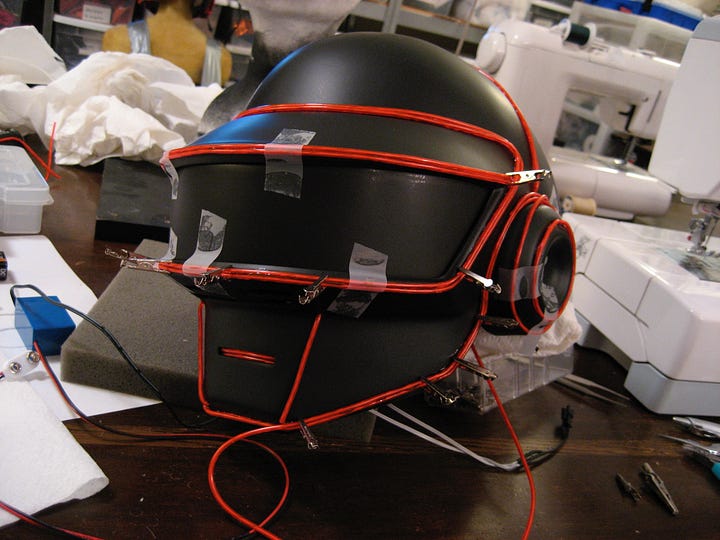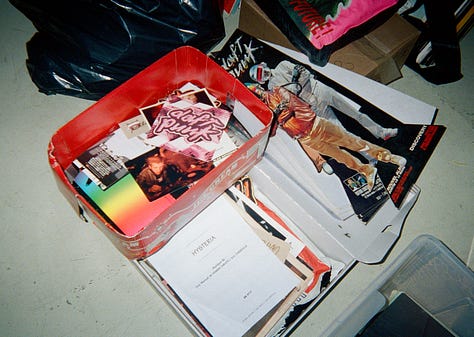It’s the banner release of the fortnight. A decade in the making. Unequivocally the big one.
That’s right: Pitchfork’s third stab at reviewing Random Access Memories.
Yes, Random Access Memories is 10 years old exactly today. 10. Rack ‘em: Zehn, dziesięć, δέκα, አስር, 십, kymmenen, عشرة, decem, dieci, dix. Ten.
If that hasn’t instantly turned you to dust, consider that RAM (10th Anniversary Edition) is being distributed and serviced in part by Sony Legacy. Legacy, ffs! Truly upsetting stuff.
But if there’s one benefit to being officially old as sin — beyond the ability to write “For 2013, Forever Ago” and watch a single tear roll meaningfully down your cheek — it’s having the vantage point to witness music go to market a second time. Particularly when it comes to nice round numbers, the gears of near-past nostalgia are ready and waiting for those who can afford to lubricate them.
That certainly applies for our good friends Daft Punk, whose team have put so much welly into the reissue of their Grammy-sweeping juggernaut, you’d be forgiven for thinking it was a new record entirely.

From the huge financial outlay across a six-year run up, to a spirit of carefree abandon which overtook otherwise professional studio specialists, to the mixed impact it had on commercial pop, to the way it’s being pushed today with experiential activations in museums and OOH advertising, RAM effortlessly commands the column inches.
All of which leads me in a typically roundabout fashion to the quasi-Sunday Review I wrote on it. You can find that here. There’s also a complimentary article which ran a few weeks prior in the NME, where I was a talking head, riffing on RAM’s fortune to be released in a sweet spot right before streaming upended the game.
While they differ in sound, songcraft and reputation, you can accurately say that Homework, Discovery and Human After All were variations on a decks-and-drum-machine theme.
RAM’s stated intent to make quote-unquote real music and the immense success that followed brokered a renegotiation in the contract between Daft Punk and their existing audience.
There’s a heap of subnarrative worth unpacking, which is why Pitchfork were after a full, ‘unsweaty’ (their words) retrospective on this self-perpetuating mythology machine of a record, as well as the general movements of the group that made it.
And wouldn’t you just know it, I happen to be finalising a book about this very topic! Wonderful. Love to Get Lu—
Forcing an early intermission to avoid grave embarrassment with the world’s most obvious pun.
In case threading multiple teases through a big review on P4K dot com wasn’t enough, here I am, cap directly in hand, asking you to pony up so that I might one day also afford a session at Henson B.
Not that I have any material to lay down. Just curious about whether the sprit of Karen Carpenter truly does haunt the gaff.
In After Daft, RAM is bifurcated across chapters 12 and 13. Chapters 14 and 15 train more of a wide-angle lens on the state of dance, electronic and pop culture in the early 2020s — as well as the intriguing cottage industry which has sprung up following the protagonists’ creative dissolution. It’s fresh in mind, so the commission came at a useful time.
To that last point: the way Daft Punk have been Lazarus’d over the last few months is intensely interesting, right?
Artists either drift into obsolescence, see their runs curtailed by tragedy, splinter into side projects with only reluctant groans about their former iteration, or dip, then basically sit by the phone waiting for the right offer to return. No-one in 2003 truly believed JAY-Z was tapped all the way out.
I can’t think of any clear analogues in modern music history where an act of this size gracefully calls it quits, and appear to genuinely mean it, yet immediately opt to engage the afterburners and retain a dominant presence.
Full Morricone x Morales (John, not David) energy on this, the best of the bonus material.
Daft’s liberation from pressure and freedom to toy with their now-retired personas, as well the structural shifts which have occurred behind the scenes, is such a fun narrative rabbit-hole to burrow down across the book’s final pages. A.D. gets several key voices on record who have direct influence in orchestrating this post-split state of affairs. (You won’t find them in the initial announce, but they’re banked.)
I don’t just mean having a social team behind RAM 10, either. It’s a total shift from dormant life to bustling death: The once-tight ring of information and control surrounding them has loosened, vault rarities are hitting DSPs, fresh samples keep getting surfaced by AI, friends and affiliates are pushing forward with material new and old — the lot.
All in, it makes the death knell rung seem fairly premature. Anything taken as set in stone even two months ago, let alone at the start of 2023, is at risk of feeling acutely redundant right now.
First Names Announced!
No waffle, cold open: It gives me 70% enormous pleasure and 30% extreme trepidation to unveil the first wave of contributors inside the newly christened After Daft: The Rewiring of 21st Century Culture...
For the review itself, I puréed a bunch of the above thoughts while giving a whistlestop tour through the making-of and aftermath of RAM.
There was a heap of storytelling to syndicate from the book (first draft of the piece in Google Docs was 4850 words, yikes lol), so it wound up compact by necessity. You say florid, I say fizzy; you say dense, I say detail-rich; let’s call the whole thing off.
Peter Franco vividly painted a picture of the 2008-12 sessions as a kind of lush summer camp. The visual of a Stroke — especially one who measures 6’2”, slouching — being seconds away from an overzealous, mid-kickabout clattering is probably my favourite anecdote out of 300+ hours so far. Per the piece:
Bangalter drastically reduced his liquid intake to enable 15-hour stints without the flow-jarring mundanity of bodily functions. De Homem-Christo—“the wrangler to Thomas’ wild buck,” as Franco puts it—typically offered feedback from a nearby couch, sharpening a song’s contours by requesting lighter snares here or extra syncopation on a two-bar loop there.
(He also nearly wiped Julian Casablancas out with a late tackle during an impromptu soccer game; whether this was a motivating tactic remains unclear.)
Some say Guy-Man is still sliding to this day.
On the topic of raking shins, here’s the million-dollar Q: How good is RAM, really? Pound-for-pound, song-for-song. Is it Thriller, or is it Be Here Now?
Don’t scoff. Spend as much time online as I regrettably have, and that is a true-blue comparison which gets made. I obviously don’t agree, but if the Robots’ reputation wasn’t spotless (and if Goldie hadn’t recorded a shocker with Noel Gallagher during the ‘90s anyway), there’s a conceivable universe in which RAM might have been chalked up as the electronic equivalent of coke bloat.
Disciple or dissenter, one thing which cannot be quibbled about RAM is that its luxe funk-pop ricocheted heavily across the major-label spectrum.
The wave has receded enough that it’s actually easy to forget just how inescapable those throwback jams were on the radio, shop tannoys, in public spaces, etc. So, so, so many transactional collaborations with, or ripoffs of, chiffon icons from the past. No bueno. Once again, per P4K:
RAM’s titanic popularity offered a roadmap to disposability, sparking a wave of cosplayers who gestured toward the album’s burnished chrome and instructed their labels that, if enough money was dumped down the hole, they too could attain a throwback vibe, man. Top 40 radio and festival bills alike became hopelessly bogged down with yawningly sterile business-class bops, a mid-2010s morass of Earth, Wind & Dire.
Such is the curse of music as Fabergé egg. Where the visuals for Stardust’s “Music Sounds Better With You” and Discovery counterpart Interstella 5555 conclude with the dream of a child, RAM comes off like the high-spec dream of an adult. Which is fine if that’s your thing—and to be sure, it is a great many people’s thing—yet the most self-evidently perfect recording of the century can’t help but feel as if it’s best admired through a gold vitrine.
Out to everyone who sent messages about ‘Earth, Wind & Dire’ btw. It’s a pleasure to serve.
One thing I didn’t have enough space for is an alternate, less rosy read of giving life back to music. A handful of festival-headline level contributors to A.D. recall taking umbrage with the fact that, in the shadow of RAM, their entire raison d'être was now being shaded as lesser — an implied pat on the head to your kid cousin working through his little complextro tunes on a DAW.
I’ll save that for the book, but it’s a perspective that grabbed me. Compared to Daft’s first two studio LPs, where extreme favourability is pretty much bolted-on, the plurality of opinions swirling around their swansong make for a marked contrast.
That the scores on the same website have ping-ponged around from very high to middling and back, rather than following the usual trend of an upward grade for reissues, feels telling about how challenging it is to alight upon consensus. (Whether you should be affixing a numerical value on art is a whole other debate; buy me a pint if you see me about this summer and let’s get into it.)
Gazing back through the ten-year telescope, it does feel like anyone who hung an instant perfect-score lanyard around the neck of this thing seem to have been hoodwinked, bamboozled, and so on. Not that it’s bad. It’s good! But perfect?
When you take the temperature of 2013, though, that reflexive impulse to anoint is understandable. That year’s hundred-howitzer assault of big-ticket albums got covered within the NME piece, yet if anything, writer Thomas Smith was restrained when rolling out his parchment scroll.
By June, we’d had Amygdala, Yeezus, 100% Galcher, Sunbather, Rollin’, Modern Vampires of the City, The Redeemer, Bankrupt!, Settle, Paramore, Push The Sky Away, Shaking the Habitual, Thank You for Letting Me Be Myself, 1017 Thug, Excavation, Tomorrow’s Harvest, RTJ, RAM, m b v, Justin, JAY and the Jai Paul leaks.
Also “Numbers on the Boards,” which I’ll pretend merits an inclusion on relevance grounds because So Me directed the video, but really just because it’s insanely sick.
Oooo remembers ‘yuugh.’
It’s a wild run in terms of both notability and quality, and that’s somehow before your Beys, Drakes, Lordes and lounge-lizard Alex Turners rocked up to dominate Q3-4. Factor in a digital music media that had yet to pivot off a cliff to video, and it’s not hard to see how usual critical faculties got abandoned in the flurry.
Of the discourse about poptimism which (g)rumbled on throughout the 2010s, one kernel of dissent always stuck with me, courtesy of Chris Richards, formerly guitarist in Q and Not U — by the by, surely the only person to ever travel along a math rock-to-WSJ pop critic pipeline. I don’t agree with it all, but I have been thinking about this invective a lot while going through edits and proofs for the book:
For a good critic, listening to a recording should be like a skeptical stroll around the new-car lot, not an unwrapping frenzy on Christmas morning. Listening alongside fans on social media, racing toward a verdict, too many writers seem to be getting swept away in the lovefest.
Worth mulling when reflecting on RAM.
The joy balled up in its release is beyond question, a period millions look back on with extreme fondness — the album arrived with an xG [Expected Greatness] of 0.99, and almost insuperable goodwill swirling around Thomas and Guy-Man themselves.
Whether you found yourself regularly digging out the LP, or have even been re-electrified enough this spring to participate in the Snapchat scavenger hunt, is another question entirely. Mileage may vary.
Speaking of mileage, time to pull this newsletter off the freeway before I run out of gas. Few updates and bits of housekeeping:
— In April, I guested on Telekom Electronic Beats’ The Week podcast for a Coachella special, shifting from the well-trodden ground of Daft Punk’s hyper-consequential 2006 set onto the festival’s electronic offering over the following 15 years, the Frank fallout, as well as how it felt to attend as a discerning punter in 2022.
As part of the show, recorded on the Monday after W1, I also hedged that Fred Again.. would headline by 2024/25. That prediction took all of six days to come to pass. Even a stopped clock...
— Although I am locked in with A.D., the rolling playlist of tunes I’ve been enjoying lately has been maintained on a regular basis. There’s a starter pack to flick through above, but you can find the full thing on TIDAL (evidently the premium choice), Apple & Spotify.
— Being fully honest, I’ve got a family health matter which completely trumps work in the urgency stakes atm. Hence the slower pace on these newsletters right now, and everything else in life, than I’d like.
Fortunately June to August gives convenient air cover, as no-one will be reading these things anyway, so I can get back at it with one full essay or interview per week/fortnight as intended once my wife and I have been put through the paces of our second gross NYC summer.
— For whatever reason, this time of year seems to be where a lot of good work gets done. Here’s a May threepeat, all features I loved writing and would recommend you check out and/or revisit:
Near-Past Nostalgia II: This Time It’s Personal
A week spent around Portland with the delightful scamps in Pavement – The Guardian cover story. (May 2022)
Head-to-head with Moby, comparing him to Chernobyl amongst other things, for TIDAL. (May 2021)
On Luomo’s Vocalcity for Resident Advisor. (May 2020) [Seriously, go listen to this today. Easy top 50 all-timer for me. Maybe even top 25.]
That’s pretty much your lot. Next up on the docket for me is an interview that should bring abundant mirth to more or less anyone who’s been near the radio or the internet in the past 15 years. Prize available for those who guess correctly.
As it might be a couple of months until I re-emerge, here’s a few photographic loosies to wrap. Fwiw, these galleries can only be viewed in full on the web version of this newsletter; if you’re on email, you’ll get a static grid, so click through on the headline up top.
Sentimentality comes in many forms. It can comprise an archival breadcrumb trail…




…as well as fresh in-the-field (or on-the-Zoom) research over the past 20 months, during which time I’ve undergone an apparent metamorphosis from clean-cut schoolboy into David Crosby x Howard Hughes.









Hey, look at that. The serotonin just started pumping again. Memories are great — who knew?
Take care now. Ciao.






